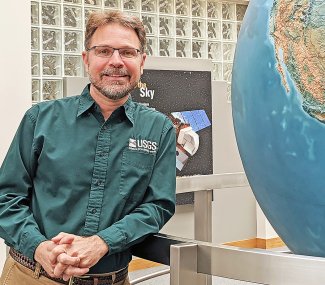
Pete Doucette, director of the Earth Resources Observation and Science (EROS) Center near Baltic, will share the mission of the U.S. Geological Survey facility at a free public lecture at 6 p.m. Friday, Nov. 17, at McCrory Gardens Education and Visitor Center.
Doucette, who has been at EROS since March 2020 and its director since March 2021, has titled his message “New Directions in Land Change Science.”
This year marks 50 years for EROS, which has long partnered with faculty and students at South Dakota State University.
Doucette’s talk is the Virginia and J. Edward Holtry Distinguished Lecture in Geographic Information Science within the SDSU Department of Geography and Geospatial Sciences.
Among the developments in EROS’ practices is deep learning, or artificial intelligence.
“Deep learning methods are particularly good at recognizing image patterns that can automate the process of identifying landscape types as well as changes over time, such as deforestation, urban growth, crop growth and harvest,” Doucette said.
To more accurately pinpoint changes, EROS uses a combination of data collected from satellites, airplanes and ground-based sensors, Doucette said.
EROS then produces publicly accessible maps and reports on crops, forests, rivers and cities, etc. He said the information can determine the extent and area of different crops as well as tracking how they change through the growing season.
Doucette said decision makers use this information for a variety of purposes, including monitoring landscape changes, assessing land health and making informed decisions about land use, such as agriculture and conservation of natural resources.
“Additionally, these activities inform future land use policy choices that balance economic, environmental and social interests,” Doucette said.
- Contact:
- Telephone number: 605-688-4538
Republishing
You may republish SDSU News Center articles for free, online or in print. Questions? Contact us at sdsu.news@sdstate.edu or 605-688-6161.

